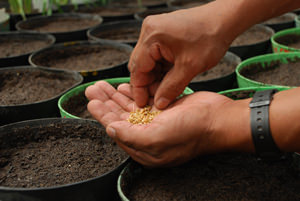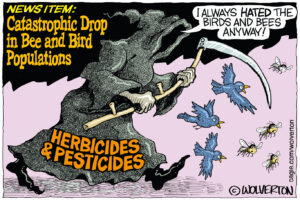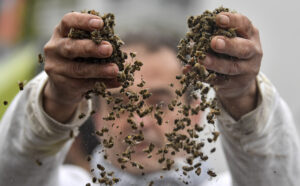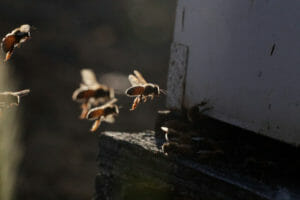L.A. Considers Banning GMOs
The City of Angels may prohibit the sale and distribution of genetically modified organisms to become the biggest GMO-free zone in America. But it's not just about ridding Los Angeles of them. As one of the councilmen who proposed the measure puts it, "so goes the West, so goes the rest of the country."
The City of Angels may prohibit the sale and distribution of genetically modified organisms to become the biggest GMO-free zone in America. But it’s not just about ridding Los Angeles of them. As one of the councilmen who proposed the measure puts it, “so goes the West, so goes the rest of the country.”
Introduced on Friday by City Councilmen Paul Koretz and Mitch O’Farrell, the ordinance aims to protect personal and communal gardens from catching the GMO bug. These DNA-altered organisms are mainly used by large farms, but Koretz and O’Farrell want to have the ban in place in case the seeds and plants are intended to be sold to home gardeners. Although L.A. wouldn’t be the first place to disallow the sale of genetically modified organisms—in California alone, Mendocino and Marin counties and the city of Arcata all have bans in place—the proposition is meant to get the ball rolling in the rest of the states by using L.A.’s influential position to inspire similar movements. The Huffington Post offers more information on the proposed ordinance:
“The pending ordinance would be symbolic more than anything else, but we do feel it’s an important step to have the second-largest city in the nation declare itself as against genetically modified seeds,” said [David King, head of Learning Garden and Seed Library of LA].
Joanne Poyourow, executive director of Environmental Changemakers of LA, said targeting city gardeners is easier than large farmers.
“Right now, it is very challenging to save that diversity in the farmlands, but we think we can provide significant help in saving that diversity by saving seeds within the cities,” said Poyourow, who also worked on the motion.
Poyourow is part of a community of heirloom seed-savers in LA. “Our objective is to preserve a large area where heirloom seeds can safely be saved,” she said.
O’Farrell said he thinks the worldwide decline of honeybees is the “canary in the coal mine” for GMOs. U.S. World commercial beehives declined 40 to 50 percent in 2012, with the suspicions of some beekeepers and researchers falling on powerful new pesticides incorporated into plants themselves. In California, almond agriculture, which depends on bees, has been hit especially hard. About 80 percent of the nation’s almonds are produced in central California.
“A growing number of problems are being traced to GMOs,” Koretz said in a statement. In addition to loss of bees, he cited “the evolution of ‘superbug’ insects which are growing immune to the pesticides engineered within GMO crops” and “‘seed drift’ (for example the recent finding of GMO-pollinated wheat growing in an Oregon farmer’s field).”
Proponents of GMOs — including food, biotech and chemical companies — say there is no research proving that genetically modified food has less nutritional value than non-modified food. They also point out that genetic modification allows for insect- and weather-resistant crops that can help meet a rising global food demand.
The LA motion comes weeks before Washington state will vote on ballot initiative 522, which calls for labeling food products that contain genetically modified ingredients.
Last November, Californians narrowly defeated Proposition 37, which would have made California the first state to require that genetically modified food be labeled. Monsanto, Kraft and Coca-Cola were among companies contributing to what became a $46-million “No on Prop 37” radio and television campaign. Proponents raised $9.2 million.
The ban would not address the sale of genetically modified foods.
—Posted by Natasha Hakimi
Your support matters…Independent journalism is under threat and overshadowed by heavily funded mainstream media.
You can help level the playing field. Become a member.
Your tax-deductible contribution keeps us digging beneath the headlines to give you thought-provoking, investigative reporting and analysis that unearths what's really happening- without compromise.
Give today to support our courageous, independent journalists.





You need to be a supporter to comment.
There are currently no responses to this article.
Be the first to respond.